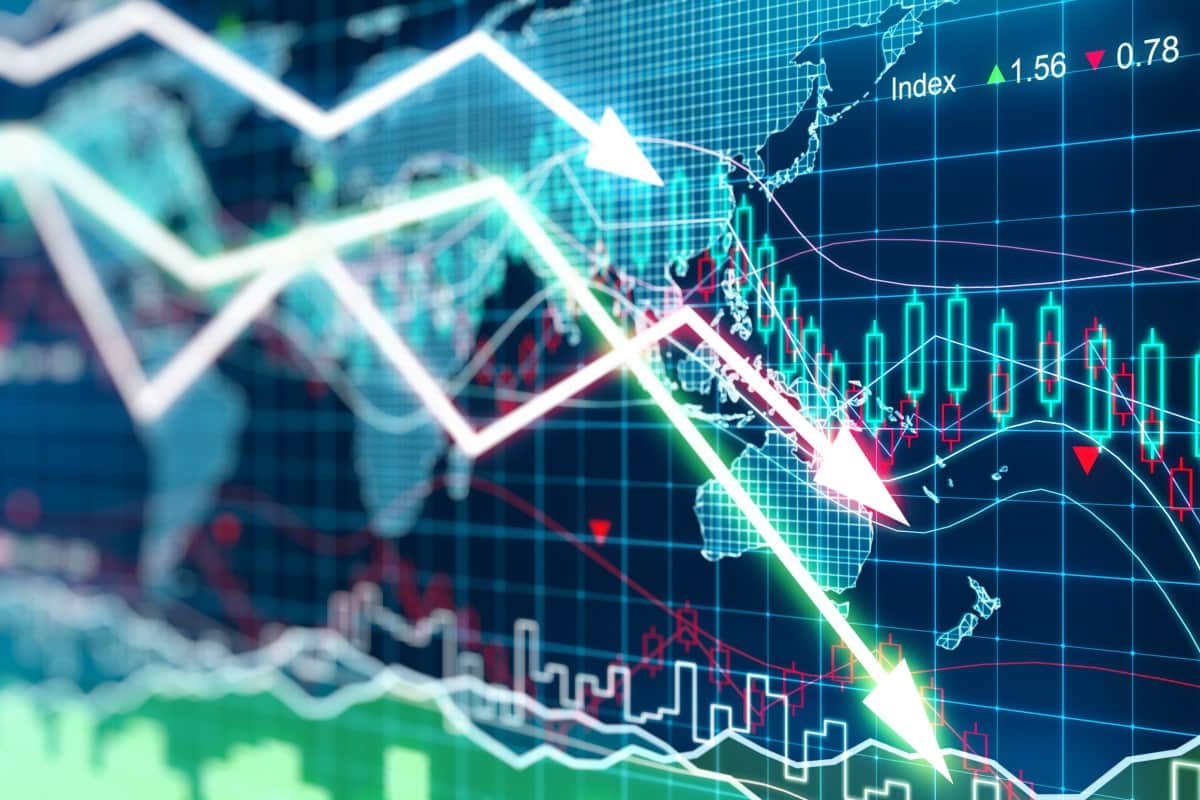

What Financial Markets Are, and Why They're Important
But even if you think this, the fact is that you interact with financial markets, if not daily, then very often. If you'd like to understand how markets work, keep reading.
Financial Markets: Definition
Let's start with the definition of a financial market. Financial markets are a marketplace where people trade assets such as currencies, derivatives, bonds and stocks. The financial market serves as a place where traders can purchase and sell securities and speculate on prices. They also provide money for companies.
Financial markets are a marketplace where people trade assets such as currencies, derivatives, bonds and stocks. They also provide money for companies.
The financial market includes the well-known word "market", which indicates a place where products can be bought or sold. The only difference with a goods market is the products you purchase or sell. In a financial market, securities are the product for sale.
Why You Need to Understand Financial Markets
You may think, "why should I try to understand how financial markets work if I'm only interested in currency trading?" We're here to tell you that it's vital to have a full overview of this concept.
- Potential profit. Financial markets serve not only to create liquidity for huge businesses and enterprises but to benefit those who want to trade assets. If you understand how markets work, you'll easily find a market for online trading.
- New opportunities. Have you ever thought that you could lose your job because the company might go bankrupt, have a bad CEO or experience a financial crisis? Would you like to prevent this from happening and feel more confident? Financial markets allow you to change your standard office job into something more attractive. They also can't operate without people, so they create additional job opportunities.
- Capital. You should know about financial markets if you're a trader, own or represent a company or work for a government entity. All of these are participants in financial markets that receive access to capital.
History of Financial Markets
It's challenging to present a history of financial markets because it's really an umbrella term for many markets. Since the stock market is the most significant, let's talk primarily about its history.
It's widely accepted that the stock market began operating in the 17th century. The Amsterdam Stock Exchange was the first stock exchange established in 1602. It managed the assets of the Dutch East India Company, the first company that issued corporate stocks and bonds. It was a prototype of modern financial markets.

Types of Financial Markets
You may have noticed that we refer to financial markets in the plural. That's because there are many types. Let's consider how they differ, their benefits and their drawbacks.
Over-the-Counter (OTC) Market
The OTC is a decentralised market that doesn't have a physical location. Trades are provided digitally. The over-the-counter market doesn't require a broker, so trades are made only between two parties. This market presents stocks of smaller enterprises that can't enter larger markets like the Nasdaq or the New York Stock Exchange. Smaller companies can access OTC markets because these markets have lower requirements. It doesn't mean that stocks there are bad, but if you need more reliable securities, you should enter global stock markets.
|
Advantages |
Disadvantages |
|
Fast. The process of trading is faster because it doesn't require a third party (a broker). |
Less reliable stocks. The OTC market has lower requirements for firms to issue their stocks. That's why such stocks may be less reliable assets. |
|
Security. The lack of a broker creates risks for your financial security. |
Bond Market
A bond or fixed income market is the financial market where companies issue bonds and investors buy them. Bonds are a kind of loan investors provide to firms. Companies issue bonds to attract funds for different purposes. By buying bonds, investors get a percentage of their funds, with payments made at predetermined dates.
|
Advantages |
Disadvantages |
|
Low risk. This is the primary advantage of the bond market. Bonds are one of the most reliable securities. The only reason you may not receive a payment is if a company goes bankrupt. However, companies rarely close their business. |
Lower gains. If you want long-term investments with limited risks, be prepared for lower yields. Only high risks can bring substantial results (and substantial risks). |
|
Guaranteed payments. Guaranteed payments are also a good choice for investors who want to receive a stable income. |
Forex Market
Forex is one of the biggest financial markets with a significant annual turnover. Online brokers made this market even more attractive for traders: it takes just several minutes to place a buy or sell order. The main idea behind forex trading is that it combines buyers and sellers of a specific currency worldwide. That's why it takes several seconds to place an order and find a buyer/seller for your asset.
|
Advantages |
Disadvantages |
|
Fast potential profit. It takes several minutes to see results on the FX market as it allows trading on different timeframes starting from 1-minute. |
High risks. High risks are the primary limitation of the forex market. |
|
Easy market. Although you need to have knowledge and skills to place orders on the forex market, currency trading is much easier than trading on a stock or bond market. Everyone has a chance to do well. |
Stock Market
A stock or equity market is a marketplace where companies issue stocks to attract additional funds, and investors purchase them to own company shares. The main difference between it and the bond market is that by holding stocks, you own a company's share. When you buy bonds, you only provide a loan to a firm that will be paid back later. As soon as you get your money back with interest, you can no longer require additional payments. When you hold a company's stocks, you receive income until you sell your shares or the company goes bankrupt.
|
Advantages |
Disadvantages |
|
Long-term investment. Stocks are long-term investments that allow you to get income for at least several years. |
High risks. The stock market is one of the most volatile. Compared to the bond market, your income can be wiped out more easily. |
|
High potential profit. The equity market provides high rewards, as investors should be paid for increased risk. |
Derivatives Market
A derivative is an agreement between at least two parties. The value of the derivative is based on the chosen asset or assets if we talk about indices.
When you trade on the derivatives market, you don't deal with real assets, such as stocks, commodities, bonds or currencies; you trade financial products that derive their value directly from the chosen asset. Futures, options and CFDs are examples of the derivative market's instruments.
CFDs are one of the most famous financial products provided by many forex brokers. 'CFD' stands for contract for difference and allows you to trade not real assets such as oil, gold, or stocks, but rather to speculate on the price difference.
|
Advantages |
Disadvantages |
|
Low risks. The derivative market is considered one of the least risky. |
Risks of loss. Although every market includes risks of loss, derivatives have a higher degree of risk probability. |
|
Easiness. This market doesn't require specific knowledge and allows you to trade without particular research. |
Commodities Market
A commodity market is a marketplace where investors can place buy/sell orders on commodities or natural resources. For example, oil, metals, and corn. This market is mostly presented by CFDs that allow you to utilise the price speculations without owning real securities. What will you do with barrels of oil? It's better to take advantage of a correct price prediction.
|
Advantages |
Disadvantages |
|
Stability. Most of the commodities serve as safe-haven assets that are used by traders in times of uncertainty. |
Difficult to predict. Commodities have a limited range of fundamental factors that affect their price and can be foreseen. |
Money Market
The money market's main feature is that securities have high liquidity but short-term maturity (not more than a year). Such securities provide safety but low interest. The most famous examples of the money market are US Treasury bonds, municipal bonds and certificates of deposit with a short maturity.
|
Advantages |
Disadvantages |
|
Low risks. Instruments of the money market include low risks. |
Short-term investments. If you're looking for investments that will bring you income in the long-term future, this market is not for you. |
|
Low income. Low risks lead to lower potential profit. |
There is another way to classify financial markets: how the process is organised.
Stock Exchange
Up to now, we've talked about financial markets in general. However, big stock exchanges can also be called financial markets. We'll talk about three of them: the New York Stock Exchange (NYSE), the Nasdaq, and the Nasdaq Small-Cap. These exchanges provide many financial operations, which is why they're called financial markets.
Over-the-Counter Market
We mentioned this type of market above, but we need to do some clarification. Two big banks can organise a deal without entering a stock exchange if both parties agree on the conditions. Still, sometimes, they have to get a quote from the stock exchange if the security hasn't been previously traded. In this case, the parties place orders at a pre-agreed price. In a minute, a reverse trade occurs. There is no change in the portfolios, but the stock gets a stock exchange quote.

How Financial Markets Work
As there are many financial markets, their structure and operations differ, but we'll mention the essential points.
Most financial markets have a physical location. They include numerous participants. It's not just two parties that enter the market to buy or sell assets; every market has a regulator that monitors operations' fairness. For instance, new stock offerings must be registered with the US Securities and Exchange Commission (SEC).
In the stock market, after a buyer places an order to purchase a security, the operation is completed via a broker. The broker places the trades on the stock exchange. The trade is executed as soon as there's a seller. The buyer receives a certificate that can be transferred from one investor to another. Bonds can also be transferred between investors.
Bonds and stocks appear on markets as soon as companies decide they want to attract additional funding. At the same time, forex, options and futures markets operate based only on the principle of supply and demand.
Financial markets include many participants. Usually, they have a physical location. Parties come to the markets to either buy or sell securities.
If we talk about the forex market, it includes governments, commercial banks, central banks, traders, investment funds and corporations. All trades are made via a broker that enters the interbank market to execute its clients' trades. Brokers are regulated by institutions that differ depending on the area where the broker operates. For example, CySEC regulates brokers that operate in Europe.
Futures and options trades are made via brokers, as well. Buyers of futures get protection against price increases, while sellers protect their funds from a price decline.
Since all operations are mostly done via brokers or financial managers, they get a commission for their operations. Traders, on the other hand, make either a profit or a loss.
Giant banks are another critical participant in financial markets. They operate huge funds either themselves or on behalf of their clients.
The Role of Financial Markets
Financial markets have plenty of roles. Let's consider them.
- Smooth operations. A financial market helps distribute resources and create liquidity for businesses and entrepreneurs.
- A financial market is a marketplace for trading operations. It becomes much easier to find a buyer or a seller of the securities you have/need.
- A financial market creates products. These products provide a return for investors or lenders who have funds. Simultaneously, it helps provide money for borrowers that require additional funding.
- Make money work. What is the benefit of keeping money in your account or at home when you can try to increase your income via profitable trades?
- Securities' prices. A financial market is a place where traders buy and sell securities. But what is the fair price of an asset? Financial markets are used to define the reasonable cost of financial products.
- Provide liquidity. The financial market provides liquidity of assets. The more market participants are interested in an asset, the more liquidity it has.
- A financial market is a marketplace that arranges the efficient work of market participants and creates specific rules to do so.
What Affects Financial Markets?
Financial markets don't operate in isolation. There are factors that either lead to an increase or decrease in financial markets.
- The first factor is the question of supply and demand. It makes financial products rise and fall according to market participants' interest.
- Politics. Markets are highly dependent on political events. Politics and economics are interconnected. Wars, elections and sanctions, among other things, cause increased market fluctuations.
- Market sentiment. Investor expectations make assets move. A fair price is based on supply and demand, which is formed based on market expectations.
- Government. Interest rates, taxes and trade policy affect the price of financial assets.
- Economy. Economic indicators determine the strength of the economy, thus affecting assets that are correlated with the country's economy.
Financial Crisis and Financial Markets: Interconnection

Even if you didn't know what financial markets were before you read this article, you've probably heard about financial crises. Financial crises affect financial markets dramatically. Usually, the first market to react to the crisis is the stock market. Later, depending on the strength of the crisis, other marketplaces can be affected, too.
The Wall Street Crash of 1929
The Wall Street Crash of 1929, also known as the Great Crash, occurred in the autumn of 1929 and was highlighted by the New York Stock Exchange's collapse. This crisis had the most significant financial effect in US history, triggering the Great Depression.
There were many reasons for the crisis. One was the overproduction of agriculture, which caused financial despair among farmers. It's also worth mentioning the impact of investors' greed. The collapse happened in September, but the first market collapses were in March and May. The market managed to recover quickly, and investors believed stocks would continue rising forever. Between June and September of that year alone, the Dow Jones increased by over 20%.
The market crash and the Great Depression caused the most massive economic crisis of the 20th century for the US.
The 2007-2008 Crisis
The 21st century has already faced many financial crises. We'll mention the most significant ones.
One of the dramatic global crises occurred in 2007-2008. The crisis was highlighted by the collapse of the banking system and the US housing bubble. The ratio of home mortgage debt to GDP, which was 46% during the 1990s, rose to 73% in 2008. One of the crucial factors that led to the market crash was that lots of financial institutions had securities whose value was based on home mortgages. For example, mortgage-backed securities or credit derivatives.
When these assets' value significantly declined, the crisis began in the US, later spreading to the whole world. Because the US economy is one of the world's leading economies, it determines the global trend.
The 2020 Crash
The year 2020 is notable for a series of financial collapses caused by the Covid-19 pandemic. The stock market crisis happened on 20 February and finished only on 7 April. It was the worst market crash since 1929. International stock indices plunged quickly, with the largest decline happening on 16 March, an event known as Black Monday. On this day, global markets lost around 13% of their total value.
However, before that, the market suffered two falls. On 9 March, there was the first Black Monday when the Dow Jones Index (DJI) lost around 8%. On 12 March, the crash was called Black Thursday, when the DJI plummeted by around another 10%.
This crisis not only led to a steep drop in stocks' value but also significant volatility in the commodity market. The oil conflict between Russia and Saudi Arabia caused a decline in oil prices. WTI oil reached a negative price for the first time in history. Many companies, especially from the oil industry, filed for bankruptcy protection, which caused bond defaults. Although the market recovered in April, fears of a second wave led to repeated declines.
Should You Be Afraid of a Financial Crisis?
Many traders, in particular newbies, are afraid of crises. They believe that they'll lose all their funds, and a crisis is the worst time for their trading activities. We'll try to show you that this is absolutely not the case.
A financial crisis leads to a depreciation of risky assets and a rise of safe-haven assets. If you don't own any assets, it's time to buy them at a low price. The market is cyclical, so every fall is followed by a rise.
Stable assets continue rising even in a crisis.Thus, you can invest in them, knowing that their value will keep growing despite challenging market conditions.
Although the number of funds on the markets may decrease in times of crisis, enterprises and individuals will continue to buy and sell assets to either get additional income or hedge their risks. It means that markets keep working even in times of crisis.
Conclusion
To conclude, whether you're a professional investor/trader or not, you should know how financial markets work. It opens a wide range of financial instruments.
Before you start working with such complicated assets as stocks and bonds, you can start with the forex market. Libertex provides a convenient trading platform full of technical tools that will allow you to build an effective strategy. The broker offers a wide range of securities. Thus, the situation can work out for you even in times of crisis. Please note that trading CFDs with leverage can be risky and can lead to losing all of your invested capital. Sign up for a demo account at Libertex and explore different trading possibilities risk-free.
Let's summarise our guide to financial markets.
FAQ
What Do You Mean by the Financial Market?
A financial market is a marketplace where businesses and individuals buy and sell assets to gain money or hedge risks.
What Are the Different Types of Financial Markets?
There are two main classifications of financial markets. These are the types of traded securities and the process. There are forex, stock, bond, derivatives, commodities and money markets. There are also stock and over-the-counter markets.
What Is the Main Function of Financial Markets?
There are plenty of functions of the financial markets. One of the most significant is making everything operate smoothly. The market does that by helping to distribute resources and creating liquidity for businesses and entrepreneurs.
How Do Financial Markets Work?
Each market has its own process for operating. Still, it's worth knowing that almost all markets have a physical location. There are also plenty of participants. Brokers play one of the most critical roles.
What Are the Objectives of the Financial Market?
Financial markets serve to organise the process of trading assets. They regulate the process and set a fair security price.
What Are the 6 Functions of Financial Markets?
Financial markets distribute resources between market participants, create financial products, serve as a place for trading operations, make money work, define the fair price of securities and provide liquidity for financial products.
Disclaimer: The information in this article is not intended to be and does not constitute investment advice or any other form of advice or recommendation of any sort offered or endorsed by Libertex. Past performance does not guarantee future results.
Why trade with Libertex?
- Get access to a free demo account free of charge.
- Enjoy technical support from an operator 5 days a week, from 9 a.m. to 9 p.m. (Central European Standard Time).
- Use a multiplier of up to 1:30 (for retail clients).
- Operate on a platform for any device: Libertex and MetaTrader.